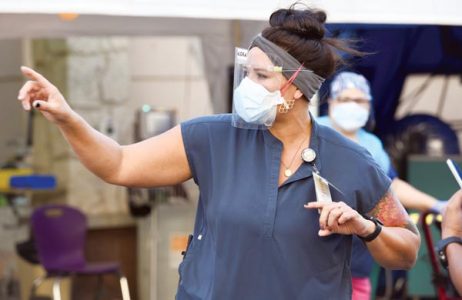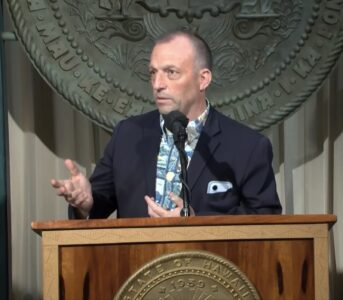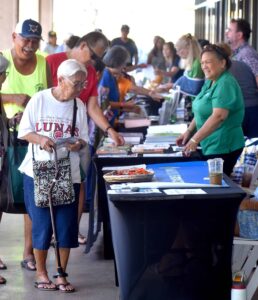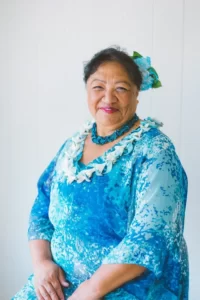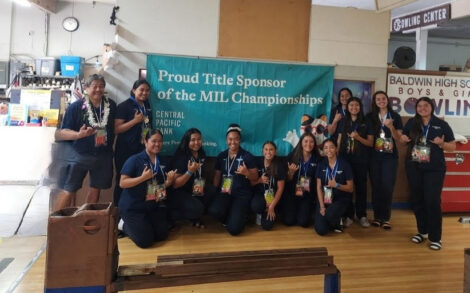Maui hospital asks to extend stay for COVID relief workers
State requests for nurses during delta surge ‘unprecedented,’ official says
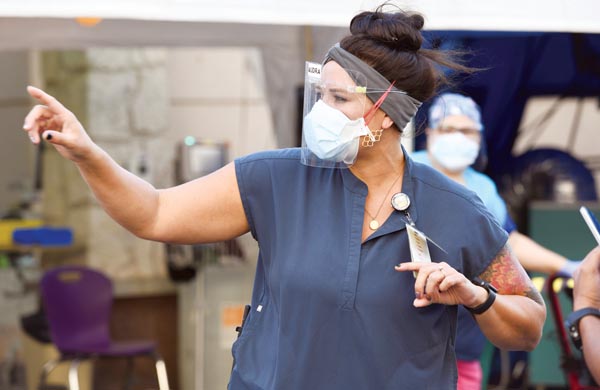
Maui Memorial Medical Center emergency room RN Audra Lard directs an incoming patient’s family member where to be screened Tuesday afternoon. Lard said she first started with the hospital as a 16-year-old student helper. As hospitals statewide struggle with staffing shortages, Maui Health is asking that the federal government extend contracts for health care workers providing COVID-19 relief at Maui Memorial. The Maui News / MATTHEW THAYER photo
Maui Health recently requested that the federal government extend contracts for health care workers providing COVID-19 relief at the island’s sole acute-care facility while Hawaii hospitals continue to grapple with an “incredible workforce shortage.”
The extension request comes as Hawaii moves into what officials predict will be peak months for COVID-19 case counts and as the nation as a whole struggles with nursing shortages.
Maui Memorial Medical Center, overseen by Maui Health, received nearly all of its anticipated 40 Federal Emergency Management Agency-funded health care workers, with a handful slated to arrive by week’s end, according to Maui Health System CEO Mike Rembis. Their contracts last eight weeks and they are primarily taking care of COVID-19 patients, who are overseen by Maui Health staff.
“I have already asked if we can have the government try to extend them for a prolonged period of time, because we are concerned about what’s going to happen after Labor Day,” Rembis said Tuesday. “None of us know what Labor Day results will be, and you won’t know for a week or two after Labor Day.”
Hawaii recently received about 630 FEMA-funded health care workers and new requests are seeking hundreds more, said Hilton Raethel, president and CEO of the nonprofit Healthcare Association of Hawaii.
The association represents more than 170 health care organizations, including most of the state’s hospitals, skilled nursing facilities, assisted living facilities, home care agencies and hospices.
Last year about 150 federally funded staff were brought into the hospitals and approximately 70 came to assist at long-term care facilities.
“This time we have three times as many staff coming in from the Mainland — and that’s still not enough,” Raethel said Tuesday.
He said the recent requests are “unprecedented” and driven by the number of people who are out sick, infected with COVID-19, potentially exposed to the virus and need to quarantine or those who quit, left the industry or moved out of state.
“We are facing an incredible workforce shortage,” Raethel said.
It remains unclear whether the federal government will fund additional relief workers or extend contracts of existing ones, he added.
At Maui Memorial, staff have been voicing burnout for some time. In recent weeks, health care workers have said they are having to work overtime, beds are not available so patients are held in the emergency room areas and pandemic fatigue is at an all-time high.
Hospital officials said they have 219 licensed beds and the capacity to increase to 300 if needed.
The trigger to increase beds is complicated and dependent on a number of factors, including number of patients, acuity level (how sick they are), disposition of patients (gender, age), staffing availability and resources for care, according to Maui Health spokeswoman Tracy Dallarda.
“It’s not a simple equation nor answer,” she wrote Tuesday. “But it’s important our community know we are constantly monitoring all of these factors and more. We are ready to act, if necessary. Let’s pray we don’t get there.”
Rembis praised Maui Health staff, noting the unique challenges of caring for COVID-19 patients.
“Our staff has done an amazing job — taking care of COVID patients is very, very physically, and I think mentally challenging,” he said. “You’re seeing a lot of very sick patients, many of them struggling to breathe. Our staff was working extra shifts. And it’s a lot of work — you have to put on gowns, gloves, masks, respirators to take care of a patient. You have to communicate with their families over the phone or on cellphones. It is exhausting.”
On Thursday, there were 32 patients hospitalized at Maui Memorial with COVID-19, including 25 unvaccinated, seven vaccinated, seven in the ICU and two on ventilators.
Raethel earlier this week discussed “crisis standards of care” and health care rationing — where resources are so depleted during a catastrophe that staff are forced to determine who gets treatment. Idaho and New York have activated “crisis standards of care” during the pandemic.
He said Hawaii’s health care leaders are doing a huge amount of work to avoid that scenario, but nothing can be guaranteed.
“We do want people to understand the seriousness of the situation, but we also want them not to be unduly alarmed,” Raethel said. “This month we are literally facing the worst of the pandemic when it comes to the stress on our health care systems. It’s not just hospitals and long-term care facilities, it’s paramedics, it’s the entire health care delivery system that is being stressed.”
“And we are working to avoid it, getting to a breaking point, but systems can break down. We’re doing everything we think we can do so they don’t break down, but we cannot guarantee that the system won’t break down.”
* Kehaulani Cerizo can be reached at kcerizo@mauinews.com.
- Maui Memorial Medical Center emergency room RN Audra Lard directs an incoming patient’s family member where to be screened Tuesday afternoon. Lard said she first started with the hospital as a 16-year-old student helper. As hospitals statewide struggle with staffing shortages, Maui Health is asking that the federal government extend contracts for health care workers providing COVID-19 relief at Maui Memorial. The Maui News / MATTHEW THAYER photo

